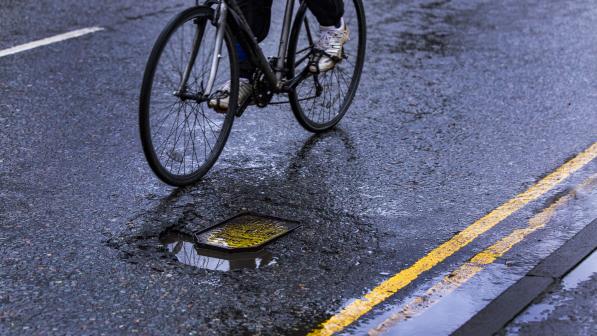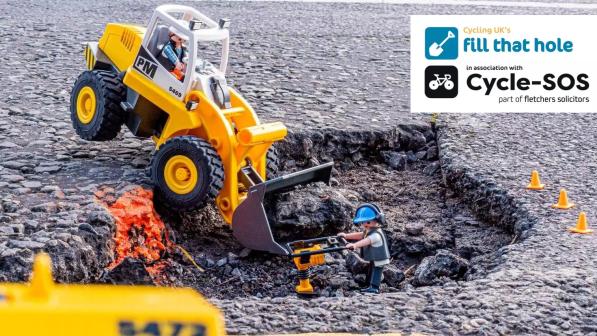Pothole crisis: roads in England and Wales resurfaced just once every 68 years

The Annual Local Authority Road Maintenance (ALARM) survey, published today by the Asphalt Industry Alliance (AIA), suggests at first glance that the persistent lobbying of Cycling UK and many other groups when it comes to potholes is having something of an impact – with the average highway maintenance budgets for local authorities in England and Wales up by 15% in 2020/21, at an average of £23.8m per authority – compared to £20.7m in 2019/20.
However, a closer look reveals that this still falls short of the 2018/19 funding (£24.5m), indicating that the increase is in fact more representative of the up-and-down nature of maintenance repair budgets, than it is of any genuine shift in the approach of central government when it comes to funding for local roads.
The findings therefore reinforced those from Cycling UK’s own research published during Pothole Watch earlier this month, which revealed that significant numbers of local authorities had less funding in 2019 than five years ago.
So, while individual ‘pothole funds’ and government grants may make headlines, local authorities are prohibited from proactively tackling the problem by investing in roads resurfacing – a more efficient use of funds overall - which requires an upfront cost that authorities can’t commit to without knowing what money they may have next year.
Most journeys are either local or start locally, and local transport needs to be prioritised by governments as coronavirus restrictions are relaxed
Duncan Dollimore, head of campaigns, Cycling UK
As a result, Rick Green, chair of the AIA has suggested that “using [this year’s extra funding] to repeatedly fill in potholes is essentially a failure, as it does nothing to improve the resilience of the network”.
This impact of this failure is highlighted by the shocking statistic that local roads in England and Wales are, on average, resurfaced only once every 68 years – meaning many local roads likely haven’t been resurfaced since the 1950s. It’s therefore no wonder that local authorities are continuously playing catch up with the problem.
For context, the “strategic road network”, which takes a small minority of traffic, receives five-year funding plans – with a current plan worth £27bn of investment. The ALARM survey estimates that the one-time catch-up cost to get our local roads repaired would be less than half of that, at just over £10bn.
Potholes aren’t just a nuisance: they pose a serious safety risk to road users, but particularly to people cycling, who are significantly more vulnerable to injury from potholes compared to drivers, who are more likely to suffer financial damage to their vehicle.

Edmund King OBE, AA president, responding to the survey, said “The ALARM report yet again shows the perilous state of many roads blighted by potholes which can injure those on two wheels and cause expensive damage to those on four wheels. The AA has in recent years highlighted the skewing of emergency road repair funding towards restoring the condition of main roads while leaving residential and other minor roads in a poor condition.”
Duncan Dollimore, head of campaigns at Cycling UK, said: “It’s bizarre that central governments still seem to expect local authorities to maintain, repair and manage their local road network without the long-term funding allocated to other transport infrastructure, including the strategic road network. Most journeys are either local or start locally, and local transport needs to be prioritised by governments as coronavirus restrictions are relaxed.
“That means long-term investment and certainty of funding, so councils can plan the repairs and improvements needed rather than just crisis manage road maintenance.”
What can you do?
Despite the negatives, the AIA’s survey found that a pothole is repaired every 19 seconds in England and Wales, highlighting just how important it is to report potholes. It’s always important to report dangerous potholes to your local authority using pothole reporting tool Fill That Hole.
If you live in Scotland or Wales, you can also take part in our actions to support out manifestos for the Senedd and Scottish Parliament elections, both of which highlight the need for more investment in local journeys.





